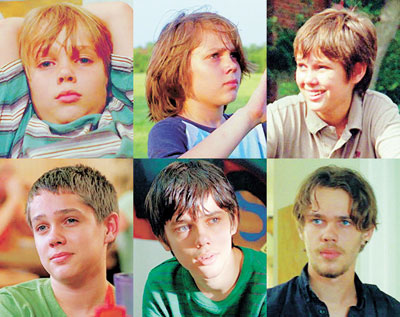
Richard Linklater’s astonishing new film, “Boyhood,” was shot over a dozen years beginning in 2002. The movie’s magic trick is that every 12 months or so Linklater gathered the same actors for a few days to check in on their characters’ lives, ultimately weaving an intimate and affecting coming-of-age tapestry* of a young Texas kid named Mason (Ellar Coltrane).
As Mason’s time-lapse* journey begins, he’s an adorable, innocent 6-year-old boy with a mop of sandy brown hair doing what 6-year-old boys do: watching cartoons, gawking* at a catalog, being tortured by his older sister (played by the director’s daughter, Lorelei Linklater).
But then we meet his divorced parents (Ethan Hawke and Patricia Arquette, both remarkable), and we catch a glimpse of Mason’s inner sadness. He hears each shouting match, sees each passive-aggressive gesture, and internalizes* them.
About every 10 minutes, the movie jumps ahead and Mason changes slightly — his hair is longer (or shorter), his voice lower. The director has smartly chosen not to make any one chapter too profound or eventful. He taps into the rambling naturalism of his “Before Sunrise,” “Before Sunset,” and “Before Midnight” films to show how the events that define us are sometimes the most banal*, like a father-and-son campfire conversation about “Star Wars.”
By the end of “Boyhood,” it’s clear how lucky Linklater was to find Coltrane. And vice versa. There’s an unfakable curiosity and vulnerability* behind the young actor’s dreamy eyes. He makes you not only care about Mason but ache for him, and pray that everything will turn out okay ... even after Linklater’s camera stops rolling.
The movie was named best picture Sunday by the Los Angeles Film Critics Association. It won four awards in total, including best director (Richard Linklater), actress (Patricia Arquette) and editing.
(SD-Agencies)
|

